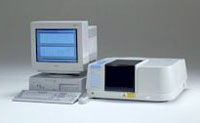 Analytical chemistry takes advantage of science and technology as well as disciplines as diverse as organic chemistry, inorganic chemistry, biochemistry, and nuclear chemistry, to identify and determine the relative amounts of substances in samples of matter.
Analytical chemistry takes advantage of science and technology as well as disciplines as diverse as organic chemistry, inorganic chemistry, biochemistry, and nuclear chemistry, to identify and determine the relative amounts of substances in samples of matter.
The qualitative analysis establishes the type of chemical species present in the sample.
Quantitative analysis determines the amount of each species in the sample.
Analytical chemistry has applications in fields as varied as medicine, industry and, in general, all sciences. Specific examples of its importance can be cited:
- In the production of steel it is essential to control the amounts of carbon, nickel and chromium, to achieve the maximum resistance and hardness of the material.
- Analyzes of these elements during production allow adjustments to their concentrations.
- In medicine, concentrations of oxygen, carbon dioxide, calcium, glucose, cholesterol, present in blood samples are determined for the diagnosis and treatment of diseases.



